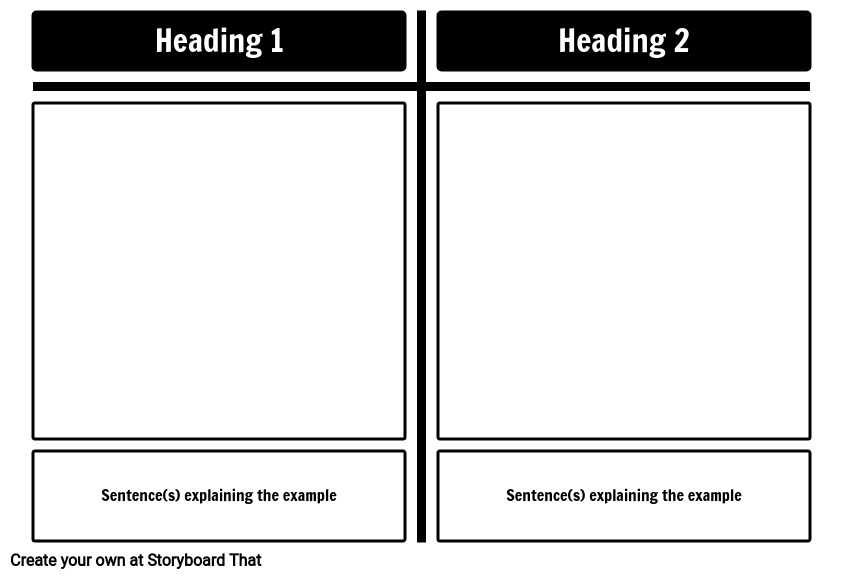Lesson Plan Overview
After learning the conjugations for the preterite and imperfect tenses, students will need to focus on how the two work together. Arguably the most straightforward situation in which preterite and imperfect tenses work together is with interrupting actions. Especially with visually or conceptually obvious interruptions, the student can clearly see how the interrupted action uses the imperfect tense, whereas the interrupting action uses the preterite tense.
Have students brainstorm scenarios that lend themselves to clear interruption. In this activity, students will use a T Chart to create interrupted scenes. Depending on each student or the class, the number of required examples can be increased or decreased. Once students are comfortable with obvious examples of interruption, challenge them to create more subtle interruptions that would also employ both preterite and imperfect tenses.
Template and Class Instructions
(These instructions are completely customizable. After clicking "Copy Activity", update the instructions on the Edit Tab of the assignment.)
Student Instructions
Create a T Chart showing interrupted and interrupting actions to practice the imperfect and preterite tenses.
- Click "Start Assignment".
- Label one column "Interrupted" and the other "Interrupting".
- in each row, create a scenario that uses both types of actions. Write a sentence for each and highlight the uses of the imperfect and preterite tense.
- Create an illustration for each cell using appropriate scenes, characters, and items.
- Save and exit when you're done.
Lesson Plan Reference
Lesson Plan Overview
After learning the conjugations for the preterite and imperfect tenses, students will need to focus on how the two work together. Arguably the most straightforward situation in which preterite and imperfect tenses work together is with interrupting actions. Especially with visually or conceptually obvious interruptions, the student can clearly see how the interrupted action uses the imperfect tense, whereas the interrupting action uses the preterite tense.
Have students brainstorm scenarios that lend themselves to clear interruption. In this activity, students will use a T Chart to create interrupted scenes. Depending on each student or the class, the number of required examples can be increased or decreased. Once students are comfortable with obvious examples of interruption, challenge them to create more subtle interruptions that would also employ both preterite and imperfect tenses.
Template and Class Instructions
(These instructions are completely customizable. After clicking "Copy Activity", update the instructions on the Edit Tab of the assignment.)
Student Instructions
Create a T Chart showing interrupted and interrupting actions to practice the imperfect and preterite tenses.
- Click "Start Assignment".
- Label one column "Interrupted" and the other "Interrupting".
- in each row, create a scenario that uses both types of actions. Write a sentence for each and highlight the uses of the imperfect and preterite tense.
- Create an illustration for each cell using appropriate scenes, characters, and items.
- Save and exit when you're done.
Lesson Plan Reference
How Tos about Spanish Preterite vs. Imperfect: Interrupting vs. Interrupted Actions
Engage students with storytelling to reinforce preterite vs. imperfect.
Storytelling helps students connect grammar to real-life contexts. Use short, relatable stories so learners identify when to use preterite for completed actions and imperfect for ongoing situations.
Prompt students to co-create a class story using both tenses.
Invite students to build a story together, each adding a sentence. Encourage switching between preterite (for interruptions or events) and imperfect (for background and ongoing actions) to practice naturally.
Model think-alouds to clarify tense choices.
Demonstrate your thought process by thinking aloud as you choose between preterite and imperfect in sentences. Explain why each tense fits, helping students internalize the reasoning.
Use visual aids like timelines to map out actions.
Draw a simple timeline on the board and plot actions as students suggest them. Mark ongoing actions (imperfect) and interruptions (preterite) to visualize when each tense should be used.
Frequently Asked Questions about Spanish Preterite vs. Imperfect: Interrupting vs. Interrupted Actions
What is the difference between preterite and imperfect in Spanish?
The preterite tense describes actions that are completed and occurred at a specific time, while the imperfect tense is used for ongoing, habitual, or background actions in the past. Understanding when to use each helps clarify the sequence and nature of past events.
How do you teach the difference between interrupted and interrupting actions in Spanish?
Use a T Chart to separate interrupted actions (imperfect tense) from interrupting actions (preterite tense). Have students write example sentences and create illustrations for each, making the distinction visually and conceptually clear.
What is an easy classroom activity for practicing preterite vs. imperfect with interruptions?
Assign students to brainstorm scenarios with clear interruptions, then have them create a T Chart listing the ongoing action (imperfect) and the interrupting action (preterite) in each row, along with illustrations to reinforce learning.
Why do we use the imperfect tense for interrupted actions and the preterite for interrupting actions?
The imperfect tense sets the scene or ongoing background action, while the preterite marks the specific event that disrupts it, helping students structure complex past narratives in Spanish accurately.
Can you give examples of sentences using both preterite and imperfect for interruption scenarios?
Example: Yo leía un libro (imperfect) cuando sonó el teléfono (preterite). The ongoing action is interrupted by a sudden event, demonstrating the correct use of both tenses.
More Storyboard That Activities
Preterite vs. Imperfect
Testimonials

“By using the product, they were so excited and they learned so much...”–K-5 Librarian and Instructinal Technology Teacher

“I'm doing a Napoleon timeline and I'm having [students] determine whether or not Napoleon was a good guy or a bad guy or somewhere in between.”–History and Special Ed Teacher

“Students get to be creative with Storyboard That and there's so many visuals for them to pick from... It makes it really accessible for all students in the class.”–Third Grade Teacher
© 2026 - Clever Prototypes, LLC - All rights reserved.
StoryboardThat is a trademark of Clever Prototypes, LLC, and Registered in U.S. Patent and Trademark Office







